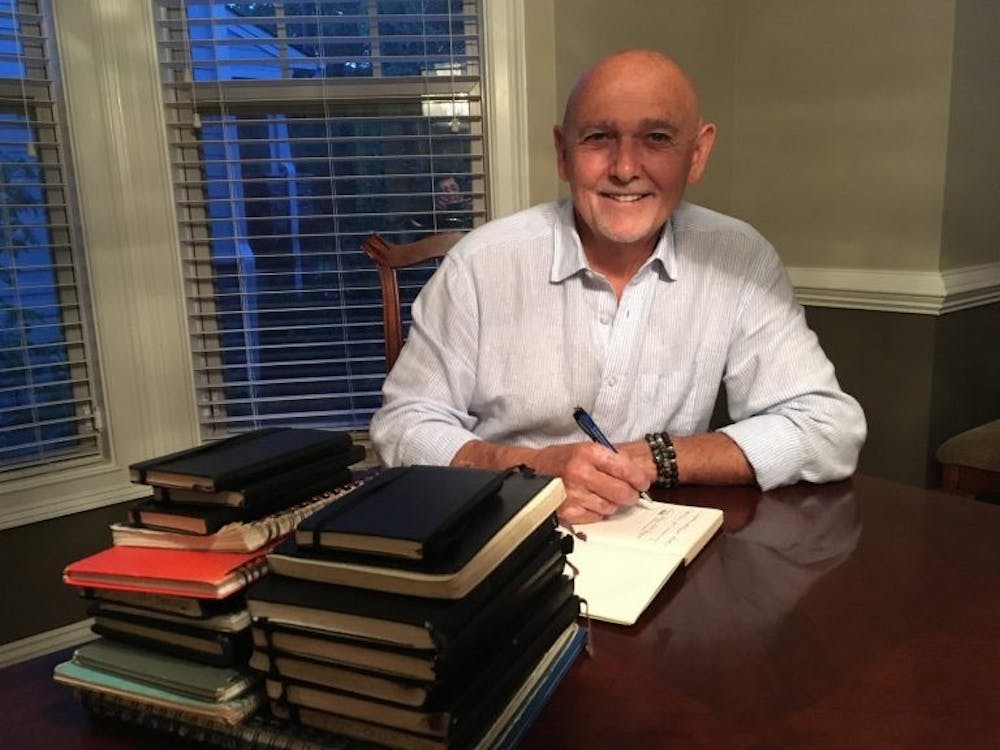In a time where the words “Zoom” and “online” have become synonymous with stress, the Franklin Humanities Institute’s Health Humanities Lab aims to fight against the stressors of daily life using these exact platforms.
Writing clinician and integrative health coach John Evans hosted one of the Health Humanities Lab’s first online expressive writing seminars after the university transitioned to remote learning. Specializing in resilience training and the use of writing to complement traditional healthcare methods, Evans has previously led a Bass Connections team studying expressive writing for adult pediatric cancer survivors. Having sensed a demand for support networks related to the pandemic, Evans, alongside Health Humanities Lab (HHL) manager Cuquis Robledo, made a quick decision to open up an online space.
“People were asking where they could find resources or workshops related to COVID-19, so we basically created a whole workshop from the ground up. It was a fast, fast, turnaround,” Robledo said.
Usually, these types of workshops are hosted in-person, asynchronously with recorded webinars or over email and Google Hangouts. However, the six-part workshop conducted over the month of April began using Zoom as a way to bring participants together. Striking a balance between preserving the intimacy of the subject with the need for community became surprisingly manageable with the use of Zoom.
“People are in the comfort of their own homes — they don’t have to go anywhere. And yet, there is a sense of community when they can look around the screen and see four or five rows of faces,” Evans said.
Robledo also noted the sense of community building, with a high retention rate across workshops and a broad geographical diversity in attendees. The attendees included undergraduates and employees, but also attracted people from Nova Scotia, Turkey and South Africa.
“By the end, we were getting new participants through word-of-mouth,” Robledo said.
But what exactly is expressive writing? Evans described it as a simple opportunity to express your most significant feelings about what is currently affecting your life.
“There’s not an emphasis on any kind of convention or any type of form — we don’t pay attention to spelling, punctuation or grammar — expressive writing is not academic writing at all. Expressive writing is really meant for the person to be the audience.”
Participants were not expected to share their writings; rather, the synchronous group meetings were designed to maximize outreach and dispel the sense of isolation due to social distancing orders. “I was delighted—we’ve had a wonderful, robust response,” Evans said.
In a typical workshop, Evans would first relay several prompts related to the topic at hand, offering participants the chance to write about their experiences. After each prompt, a post-writing reflection would help the writers better understand their emotional state. Workshops included unique writing techniques, such as writing an unsent letter to a healthcare provider or a patient with COVD-19. In one exercise, Evans also asked the participants to switch to a third-person point of view.
“People tell us that this helps them be more objective about the experience and provides some cognitive or emotional distance. It gives you a chance to kind of catch your breath on what’s going on,” Evans said.
For many working with the Health Humanities Lab, the pandemic has provided some unexpected insights into working and learning remotely. In addition to the success of the expressive writing workshop, Robledo described how the pandemic has opened up spaces to talk about the mental health of students and awareness of community members with disabilities. In the first online workshop of the Disability and Access Initiative hosted by Marion Quirici, who works alongside Robledo at the Health Humanities Lab, educators discussed disability-conscious teaching within the context of remote learning.
“With this pandemic, it’s kind of shown that faculty can make their syllabi more accessible for people with disabilities. They can take the time to extend test periods and deadlines. You can do it, so why not do it for those who need accommodations in the first place?” Robledo explained.
Moving forward, both Evans and Robledo are optimistic about the role of Zoom in the Health Humanities Lab’s projects. Robeldo said, “Definitely I foresee future events being online, and I think that’s a good thing.”
Get The Chronicle straight to your inbox
Signup for our weekly newsletter. Cancel at any time.

